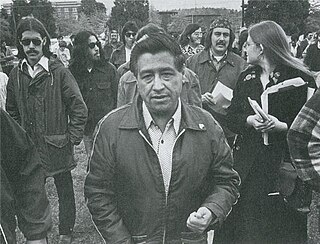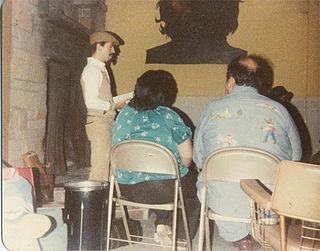El Grito del Norte was a bilingual newspaper based in Española, New Mexico, co-founded by the activist Elizabeth "Betita" Martinez and the attorney Beverly Axelrod in 1968. Before this, Martínez had worked with social issues such as the black movement and the Student Nonviolent Coordinating Committee while Axelrod had been involved in the first production of The Black Panther. The tabloid was originally the publication of the Reies Tijerina's Alianza Federal de Mercedes, an organization dedicated to recovering the lands of dispossessed Hispanos, whom Axelrod represented as a lawyer. It expanded to provide coverage of the Chicano Movement in urban areas, workers' struggles and Latino political prisoners, as well as other Leftist causes. The paper often advocated for the advancement of such minority groups as well as the Black and Native American communities.
José Angel Gutiérrez, is an attorney and professor at the University of Texas at Arlington in the United States. He was a founding member of the Mexican American Youth Organization (MAYO) in San Antonio in 1967, and a founding member and past president of the Raza Unida Party, a Mexican-American third party movement that supported candidates for elective office in Texas, California, and other areas of the Southwestern and Midwestern United States.

The Chicano Movement, also referred to as El Movimiento, was a social and political movement in the United States inspired by prior acts of resistance among people of Mexican descent, especially of Pachucos in the 1940s and 1950s, and the Black Power movement, that worked to embrace a Chicano/a identity and worldview that combated structural racism, encouraged cultural revitalization, and achieved community empowerment by rejecting assimilation. Before this, Chicano/a had been a term of derision, adopted by some Pachucos as an expression of defiance to Anglo-American society. With the rise of Chicanismo, Chicano/a became a reclaimed term in the 1960s and 1970s, used to express political autonomy, ethnic and cultural solidarity, and pride in being of Indigenous descent, diverging from the assimilationist Mexican-American identity. Chicanos also expressed solidarity and defined their culture through the development of Chicano art during El Movimiento, and stood firm in preserving their religion.

Alberto Baltazar Urista Heredia, better known by his nom de plume Alurista, is a Chicano poet and activist. His work was influential in the Chicano Movement and is important to the field of Chicano poetry.
Alicia Gaspar de Alba is an American scholar, cultural critic, novelist, and poet whose works include historical novels and scholarly studies on Chicana/o art, culture and sexuality.

Romeo Rolando Hinojosa-Smith was an American novelist, essayist, poet and the Ellen Clayton Garwood professor in the English Department at the University of Texas at Austin. He was noted for authoring the Klail City Death Trip series of 15 novels written over several decades.
Miguel Méndez was the pen name for Miguel Méndez Morales, a Mexican American author best known for his novel Peregrinos de Aztlán.
Ronald Francis Arias is an American former senior writer and correspondent for People magazine and People en Español. He is also a highly regarded author whose novel The Road to Tamazunchale has been recognized as a milestone in Mexican-American literature.

Lorna Dee Cervantes is an American poet and activist, who is considered one of the greatest figures in Chicano poetry. She has been described by Alurista, as "probably the best Chicana poet active today."

José Antonio Villarreal was an American Chicano novelist. Villarreal was born in 1924 in Los Angeles, California, to migrant Mexican farmworkers. Like Juan Manuel Rubio in Pocho, Villarreal's father fought with Pancho Villa in the Mexican Revolution. He spent four years in the Navy before attending the University of California at Berkeley in 1950.
Alma Luz Villanueva is an American poet, short story writer, and novelist.
Patricia Santana is a Latina American novelist.
This is a Mexican American bibliography. This list consists of books, and journal articles, about Mexican Americans, Chicanos, and their history and culture. The list includes works of literature whose subject matter is significantly about Mexican Americans and the Chicano/a experience. This list does not include works by Mexican American writers which do not address the topic, such as science texts by Mexican American writers.
Chicano Art: Resistance and Affirmation was a traveling exhibit of Chicano/a artists which toured the United States from 1990 through 1993. CARA visited ten major cities and featured over 128 individual works by about 180 different Chicano/a artists. The show was also intended to visit Madrid and Mexico City. CARA was the first time a Chicano exhibit received major attention from the press and it was the first exhibit that collaborated between Chicanos and major museums in the U.S. The show was considered a "notable event in the development of Chicano art." Another unique feature of CARA was the "extensive planning" that attempted to be as inclusive as possible and which took place more than five years prior to the opening at Wight Art Gallery.

Xavier Garza is an author and illustrator of children's books and professor of art at Northwest Vista College in San Antonio.
Demetria Martinez is an American activist, poet, and novelist.
The following is a timeline of Latino civil rights in the United States.
Rosaura Sánchez is a writer, storyteller, linguist and critic. Sánchez' "most singular and significant contribution to this field [Chicano bilingualism] is the formulation of a theoretical framework for the analysis of Chicano Spanish based on the premise that Spanish use in America must be considered in its social and verbal interactions." As an editor, one of her most relevant works was the novel Who Would Have Thought it? (1995) by writer María Amparo Ruiz de Burton of California, published by the Arte Público Press in Houston, Texas.
New Mexican literature includes the modern American literature of the U.S state of New Mexico, along with its former Santa Fe de Nuevo México and New Mexico territories. It is influential in English language and Spanish language literatures, and most of its history has been influenced by Native American literature, Spanish literature, Mexican literature, and English literature.





